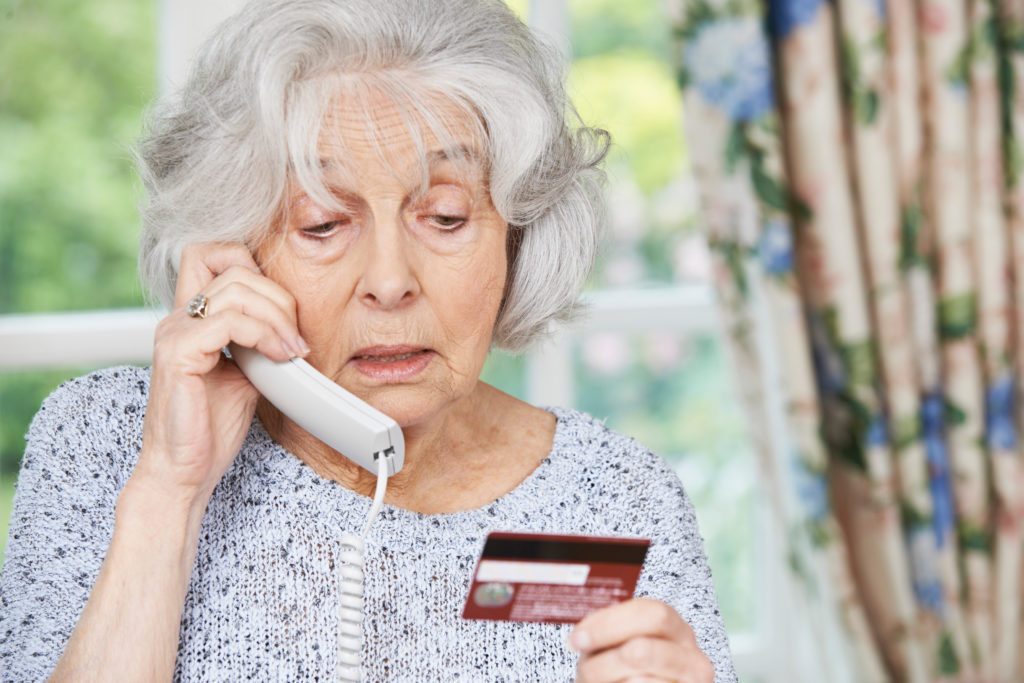
FAMILY KITCHEN – DAYTIME
A female is in the kitchen, preparing morning coffee, in bathrobe and slippers. She is retirement age.
Phone RINGS
She puts down the coffee mug and answers the cell phone.
WOMAN
“Hello?”
MALE VOICE
“Can I speak to Clara?”
WOMAN
“This is her.”
MALE VOICE
(speaking rapidly with an indeterminate accent. English is not his first language. )
“Okay, we have audit of your taxes between the year of 2009 and 2014. And we find out that taxes amount to $5,821 which is late. Right now you owe $5,821 (inaudible). Now, when the case will be done within the courthouse, your bank account will be seized, your credit report will be spoiled, your passport along with State ID will be seized.”
WOMAN
“What did you say?” (panic in her voice).
MALE VOICE
“This is, because you filed taxes but your taxes have not been filed in correct for those years. There was some problem regarding a W-2 and W-4 form. So now regarding a W-2 and W-4 form unpaid, the IRS has issued an arrest warrant on your name. And now for this unpaid taxes, once you get arrested, your each and every property will be seized like your house, your State ID your Visa, your driver’s license. Each and every property that belong to your name will be seized by the IRS…once you get arrested.”
WOMAN
“Are you sure?” (tearfully).
FADE OUT
Protect Your Loved Ones
Sound familiar? The script is played out thousands of times a day, as scammers randomly call phone numbers, in the hope of finding elderly retirees who are trusting and vulnerable to an authoritative voice on the telephone.

Below are the types of telephone scams that are popular now. If you are caring for a person who is dealing with dementia or cognitive issues, be aware and place safeguards on your loved one’s bank account (or even telephone, if necessary!) to protect them from scammers.
And talk to your loved ones about the kinds of scams out there. Be aware: a new survey from AIG and Morning Consult found most older adults are unfamiliar with some of the more common types of scams.
More than half (52%) say they’ve never heard of the prepaid credit card scam, where unsuspecting adults are told they have an outstanding debt that needs to be paid using a prepaid credit card or debit card.
In addition to the prepaid credit card scam, here are the most popular kinds of scams:
IRS Payments
A caller (like the above script) alleges that authorities will confiscate property and money unless the victim pays off the debt immediately.
Social Security Telephone Scams
Scammers posing as Social Security employees call and ask for personal information like name, Social Security number and bank account information. The caller alleges that the information is needed in order to issue additional funds or rebates or they allege that personal information has been lost due to computer glitches.
Invoice Telephone Scams
This is more often seen with businesses, but can work with individuals. Fake invoices are created and sent, alleging an unpaid bill.
Romance Scams
These scams are long and elaborate, usually involving matchmaking websites or social media acquaintances. A romantic interest will eventually begin to request financial assistance – via money wires and prepaid credit cards – from the victim.
Prepaid Credit Cards
 Scammers will demand payments via prepaid credit cards using a variety of ruses. A “lottery official” will announce that the victim has won the lottery, and needs to load up a prepaid credit card with money in order to pay the taxes on the winnings. A scammer posing as a utility support agent will threaten disconnection if the victim does not pay the utility bill with a prepaid credit card.
Scammers will demand payments via prepaid credit cards using a variety of ruses. A “lottery official” will announce that the victim has won the lottery, and needs to load up a prepaid credit card with money in order to pay the taxes on the winnings. A scammer posing as a utility support agent will threaten disconnection if the victim does not pay the utility bill with a prepaid credit card.
Pigeon Drop Telephone Scams
A “pigeon drop” is a confidence trick in which the victim is convinced to give up a sum of good-faith money in order to secure the promise of sharing a larger amount of “found money”. A common scenario: an elderly woman is approached by another woman, who claims she found a bag full of money and asks if the victim knows about the bag. A long, elaborate scam involving multiple people will unfold and result in the trusting elderly woman being convinced to provide money – or an ATM pin number – to assist in claiming the money.
As financial managers, Stableford Capital’s team members are committed to keeping our clients safe and their families secure. Talk to our team if you have any concerns about your legacy by contacting us online or call 480.493.2300.

